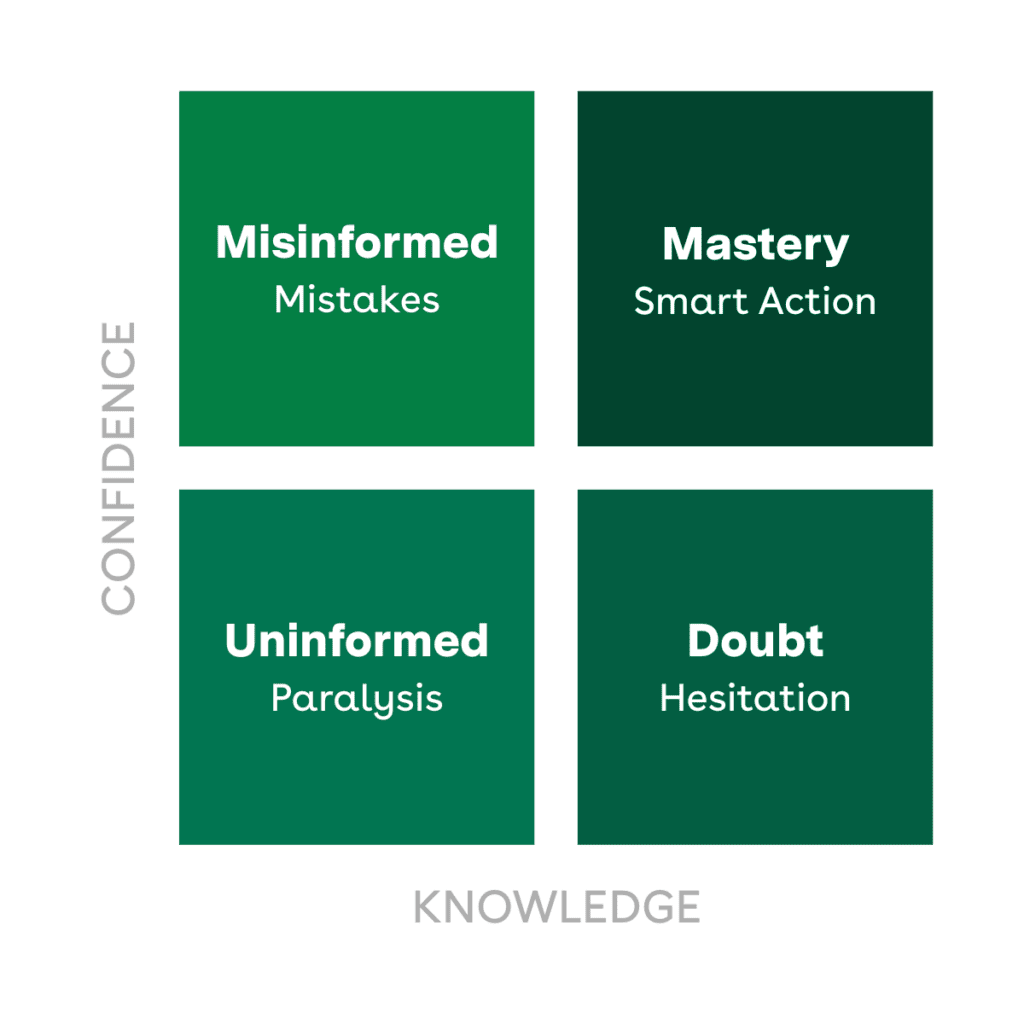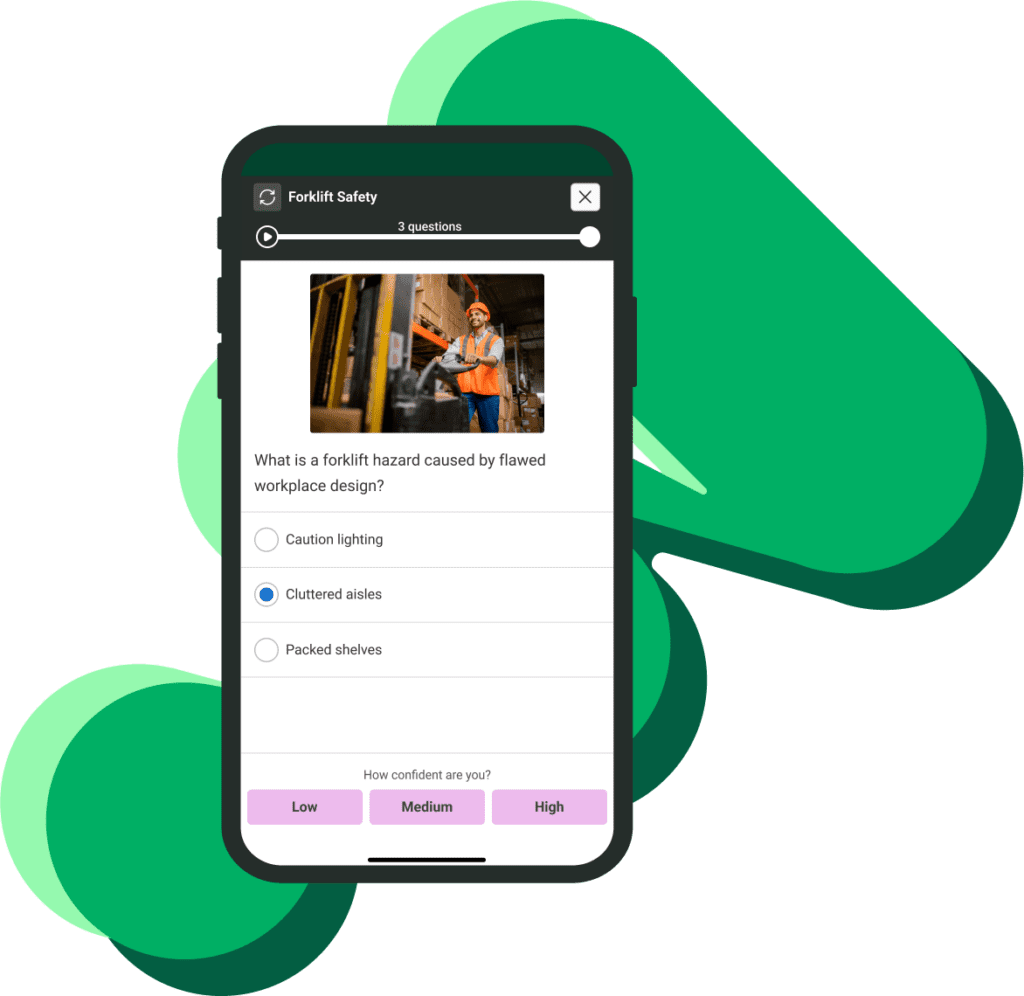Confidence-based learning: The missing link between training and performance

“Ladies and gentleman. This is your captain speaking. We’re approaching our final destination. And don’t worry, because I’m pretty sure I can land this thing.”
How would this in-flight announcement make you feel?
Or imagine working alongside a teammate in a manufacturing facility who constantly second-guesses themselves when it comes to safety protocols.
Knowledge is important in every job. Salespeople need to know their product specs. Produce clerks need to know how to handle leafy greens. Housekeepers need to know how to safely flip a bed. But knowledge is just the beginning. People must also be confident in what they know so they make the right decision when it matters most—without hesitation.
This is why Axonify prioritizes confidence alongside knowledge and skill within our digital learning experience. We know that getting the right answer on a test doesn’t mean an employee is ready to do the job. They must also know what they know so they’re ready and willing to apply what they’ve learned in real life.
The power of confidence-based learning
Dr. James Bruno, a professor of education at UCLA, spent years digging into the relationship between knowledge, confidence and behavior. His research showed that it’s critical to find the right balance between confidence and knowledge to enable real-world performance.
- Confident and correct? You act and get it right.
- Confident and wrong? You act quickly—and make mistakes.
- Know the right answer but lack confidence? You freeze.
To foster the best possible performance, we must ensure people know the answer and trust that they know it. This insight led to the development of Confidence-Based Learning (CBL)—a two-dimensional approach that measures both correctness and confidence every time someone answers a question or responds to a scenario.

When you assess both knowledge and confidence, people tend to fall into four categories.
- Masters know the right answer and trust themselves to act without hesitation. They’re ready to perform and consistently model proven practices.
- Doubters know the right answer but lack the confidence to act quickly when it counts. They may hesitate or avoid action altogether, which can slow down operations or create gaps in performance.
- Misinformed employees are confident, but about the wrong information. They’ll act decisively—but incorrectly—leading to costly mistakes, safety risks and potential reputational damage.
- Uninformed employees recognize that they don’t know the answer yet. They’re open to learning, giving you a chance to guide them toward the right knowledge before bad habits form.
Keep in mind that confidence is not absolute. It often varies by topic. An employee might be a master when it comes to safety procedures but a doubter when handling a new sales process. Confidence-based insights help employees spot their own gaps while giving you additional information needed to target coaching and development where it’ll have the biggest impact.
▶️ 25 useful performance metrics for employees
Building confidence into your learning strategy
Bolstering confidence isn’t easy. It’s definitely not something you can fix with a one-and-done training event. It requires intention, strategy and persistence. Confidence must be baked into the way you train, coach and support people every day. You must design learning experiences that help employees calibrate their sense of readiness, not just rack up high test scores.
Here are a few ways to apply CBL in your workplace learning practices:
- Use two-dimensional assessments. Don’t just ask for the right answer. Ask people to self-assess their confidence in the topic. Use a simple scale—low, medium, high—to help people reflect on their knowledge without adding complexity to the learning experience.
- Reinforce knowledge. Challenge employees to apply their knowledge with frequent, low-pressure practice activities. The more often they put their knowledge to work in realistic situations, the more reflexive and natural their responses will become.
- Adapt learning based on confidence. Use confidence data to tailor future training activities. Target quick refreshers to employees who show high confidence but low knowledge, before mistakes happen.
- Build confidence into ongoing support. Extend confidence checkpoints into coaching conversations, team huddles and performance reviews. Help managers prioritize confidence as part of their regular interactions, encouraging self-awareness, honest reflection and continuous learning across the team.
▶️ Grab your tip sheet: 7 steps to improve employee training and performance—without disrupting work
How Axonify applies confidence-based learning

At Axonify, confidence-based learning is far from a new idea. It’s been baked into the daily learning experience from the very beginning. Every time an employee answers a question or works through a scenario, they’re also asked to rate their confidence. This simple step helps people focus on how ready they feel to use their knowledge on the job, not just get the correct answer.
This confidence data is then applied across the learning experience. Future training sessions are personalized to address both knowledge and confidence gaps. Progress and achievements are determined based on improvements in both knowledge and confidence. Managers are nudged to address changes in confidence and ensure small issues do not turn into bigger operational challenges.
By connecting knowledge and confidence at the topic level, Axonify takes learning beyond memorization. Our technology ensures employees are ready to do the job so, when the pressure is on, they make the right decision without second-guessing. They know what to do, and they trust themselves to do it.
With Axonify, your people will always know how to land the plane (metaphorically speaking).
Ready to help your frontline know it—and trust they know it?
Explore how Axonify’s proven approach to reinforcement and knowledge retention ensures employees stay sharp, confident and ready to perform when it counts.